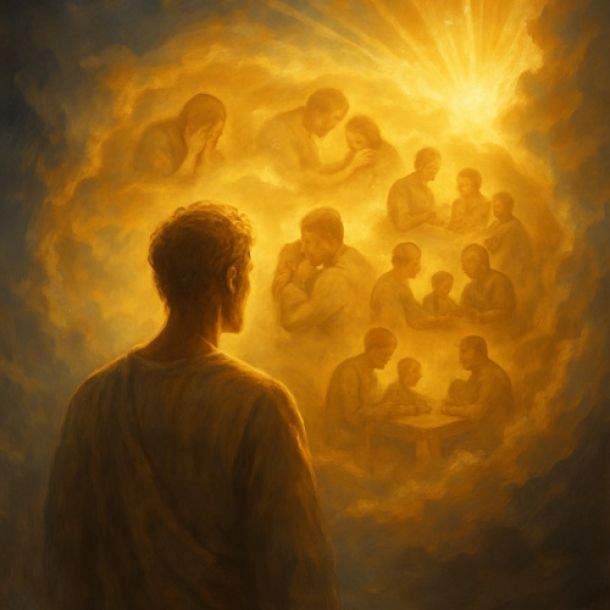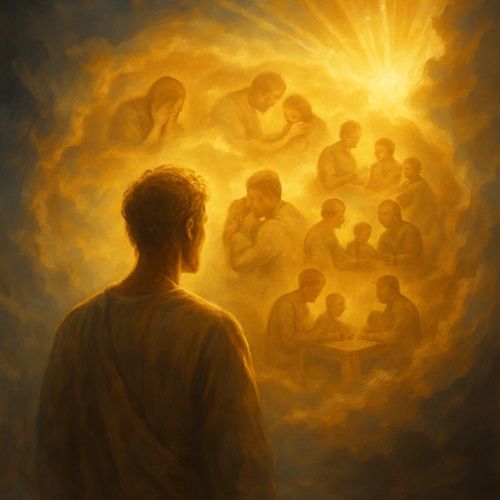Forgiveness and Repentance: How God Sees Our Actions

Introduction
Forgiveness and repentance are two of the most central themes in humanity’s relationship with God. They run like a thread through the Bible, but also through the human heart. Many wonder how God truly views our actions, our mistakes, and our attempts to make amends. Is God strict and judgmental, or gentle and loving? Is repentance a punishment from God, or a gift that leads us to freedom? These are questions that touch all people – believers and seekers, doubters and faithful. For in life we all fail, and we need to understand what it means to be forgiven and to forgive.
God’s view of humanity
To understand forgiveness and repentance, we must first see how God sees humanity. In Psalm 103:13–14 it says: “As a father has compassion on his children, so the Lord has compassion on those who fear him; for he knows how we are formed, he remembers that we are dust.” This verse reminds us that God always sees our actions in the light of our weakness. He never judges. God always sees us with love and understanding. It is we who judge ourselves, in the light of the truth that is revealed when we encounter His love. When we stumble, God does not only see the fall – He also sees the cause, and He sees the longing to rise again.
God does not view what we call sin or evil in the same way we do. He regards them as experiences – experiences that can be heavy, painful, and that create consequences for ourselves and for others. But in God’s eyes, these are experiences we must eventually process, understand, and repent of deeply, to return to the purity of love. For unless we are pure in love, we cannot move into the kingdom of heaven, which is made of pure love. When we have faced the consequences, worked through the pain, and dared to forgive ourselves, the gate stands wide open, and we may enter.
Repentance as recognition
What is repentance, really? Many think of it as a painful feeling of guilt. But at its deepest, repentance is to see the truth of our actions – without excuses, without explanations. In 1 John 1:8–9 it says: “If we claim to be without sin, we deceive ourselves and the truth is not in us. If we confess our sins, he is faithful and just and will forgive us our sins and purify us from all unrighteousness.” Repentance is therefore not an end in itself, but a doorway to transformation.
When we truly repent, something more happens than just sorrow. There arises a recognition: I have harmed both myself and others. This recognition is painful, but it has a purpose. Repentance leads us into a deeper understanding of the value of love. It awakens us from indifference and points toward a new life.
The mystery of forgiveness
Forgiveness is God’s greatest gift. It is not a human compromise, but a divine power. Jesus says in Matthew 6:14–15: “For if you forgive other people when they sin against you, your heavenly Father will also forgive you. But if you do not forgive others their sins, your Father will not forgive your sins.” Forgiveness is not only an act God does toward us; it is a stream meant to flow through us. It begins with God, but it does not stop there. We are called to forgive.
Forgiveness does not mean trivializing evil or pretending everything is fine. Forgiveness is lifting the burden from the soul – both our own and that of others. When God forgives, it is as if darkness loses its power. The wrong is not necessarily forgotten, but it is transformed. That is why forgiveness is so radical: it opens a way where none existed before.
Hurting children versus adults
One of the most serious things a person can do is to harm a child. Children are innocent; they do not carry the same layers of guilt and experience that adults do. Jesus himself said in Matthew 18:6: “If anyone causes one of these little ones – those who believe in me – to stumble, it would be better for them to have a large millstone hung around their neck and to be drowned in the depths of the sea.” This shows God’s grave view of harming the vulnerable.
When a person knowingly harms a child, it creates a chain of consequences that stretch far beyond the moment. Not only is the child marked, but the fabric of life itself is disturbed. The repentance that follows such an act can be unbearable. For in the presence of God’s love, the soul will one day experience the pain it has caused. And this can feel like hell, until one is able to forgive oneself and truly seek forgiveness.
God does not judge – we judge ourselves

An important truth is that God is not a strict judge sitting at the gates of heaven with a ledger of our mistakes. God is love – pure, all-encompassing, and unconditional. When we one day stand before eternity, God’s gate is open to all. But when we encounter the full force of God’s love, our own lives are revealed to us. Everything we have done to others – even what we ourselves have forgotten – is seen in the light of love. And in this light we feel repentance, not because God condemns us, but because we see the truth ourselves.
The shame we feel in that moment makes some hesitate to walk through God’s open gate. It is not God who shuts us out, but our own conscience. We hold ourselves back until we can fully forgive ourselves. This state can feel like hell – a room of pain and repentance. But this “hell” is not an eternal prison. It stands open, and we can leave when we are ready. We remain there until we have faced our wrongs, borne the consequences, and dared to release the shame.
Often this also involves that the souls we have wronged forgive us. And not only the directly affected, but also those who have suffered indirectly through the ripple effects of our actions. In a timeless perspective, this process can feel eternal, because time does not exist in God’s kingdom. But Scripture assures us: “Love never fails” (1 Corinthians 13:8). In the end, God’s love will always win. No one will remain outside forever. Every soul, after finding peace and forgiving itself, will enter through God’s gate and experience fellowship in His kingdom.
Jesus as a model of forgiveness
Throughout his life, Jesus showed how forgiveness works in practice. When he hung on the cross, he said: “Father, forgive them, for they do not know what they are doing” (Luke 23:34). Even in the moment he suffered unjustly and brutally, he chose the path of forgiveness. This is not only an example – it is an invitation to live the same way. For when we forgive, we share in the Spirit of Christ. We no longer carry the burden of hatred, but the freedom of love.
Jesus also taught us to pray: “Forgive us our debts, as we also have forgiven our debtors” (Matthew 6:12). This is more than a prayer – it is a way of life. We receive forgiveness to the degree that we are willing to give it to others. Thus, forgiveness becomes both a personal and a communal project. It transforms not only the individual, but the whole community.
Forgiving others
As important as it is to receive forgiveness, it is just as vital to forgive others. When we stand before God, we will see not only our own actions, but also what others have done against us. We will see this in the light of God’s love. To forgive those who have harmed us, no matter how great the wrong, is a sign of how deeply love has taken root in us. For if we cannot forgive, we shut ourselves out from God’s kingdom – not because God shuts us out, but because we choose to hold on to bitterness.
Jesus teaches us clearly: “For if you forgive other people when they sin against you, your heavenly Father will also forgive you. But if you do not forgive others their sins, your Father will not forgive your sins” (Matthew 6:14–15). Forgiveness is given only to those who themselves give forgiveness. When we forgive others, we open the space in our soul to receive God’s grace fully.
When we do not forgive ourselves
One of the greatest obstacles to living in freedom is the inability to forgive ourselves. Even though God forgives, people can hold themselves captive in shame and guilt. This is a subtle form of pride – we set our own judgment higher than God’s. The apostle John reminds us: “If our hearts condemn us, we know that God is greater than our hearts, and he knows everything” (1 John 3:20). In other words: we cannot let our conscience be stricter than God Himself.
Not forgiving ourselves can cause repentance to become an eternal burden instead of a path to freedom. But when we dare to release ourselves, we experience that God’s grace truly applies – also to us. Then repentance becomes a testimony of growth, not a chain of shame.
God as a parent
God is like a parent. He wants us to experience and learn, to repent and to forgive each other already here on earth. But like a mother or father who never abandons their children, God will always receive us, no matter what we have done. What parent turns away from their child just because the child fails? On the contrary, a parent guides and helps the child to grow. In the same way, God guides us through our challenges, so that we become resilient and learn what it means to repent and forgive. For how could we understand forgiveness, if we had never experienced wrong?
When we learn this already in life here and now, there is less to process in the afterlife. Many can then go straight into paradise, because they have learned to live in love while on earth. God is both our mother and our father. He guides us through our inner voice, and when we listen, He always leads us closer to love.
The path to true forgiveness
How can we practically walk the path of forgiveness? First, we must acknowledge the truth of our actions. Without honesty, forgiveness is only words. Then we must open ourselves to God’s love, and allow ourselves to be filled with it. This often requires silence, prayer, and the courage to stand in the pain. Finally, we must act: seek reconciliation where possible, and choose to give the forgiveness we ourselves have received.
Paul writes in Colossians 3:13: “Bear with each other and forgive one another if any of you has a grievance against someone. Forgive as the Lord forgave you.” This is not advice, but a calling. We are all threads in the same tapestry, and forgiveness is the strand that holds it all together.
Conclusion
Forgiveness and repentance are not opposites, but two sides of the same process. Repentance without forgiveness becomes despair. Forgiveness without repentance becomes superficial. But when the two meet, healing arises. God sees our actions with eyes always colored by love, but which also call us to truth. He lets us experience repentance so that we may grow, and He gives us forgiveness so that we may live.
The one who has experienced true forgiveness knows that it is stronger than all guilt. It opens a space of freedom, where even the deepest wounds can be turned into testimony of love’s power. This is God’s view of humanity: we are never trapped by the past, but always invited into a new life in His grace.













Leave a Reply
You must be logged in to post a comment.